1 RAINFLOW CYCLE COUNTING IN FATIGUE ANALYSIS Revision
advertisement
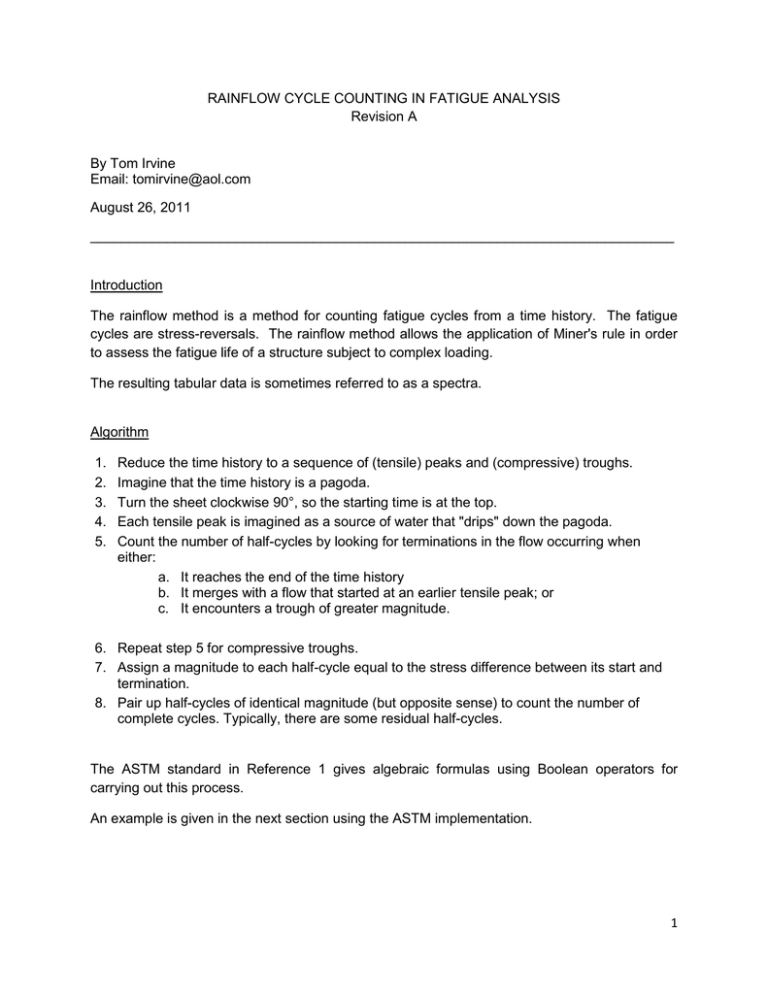
RAINFLOW CYCLE COUNTING IN FATIGUE ANALYSIS Revision A By Tom Irvine Email: tomirvine@aol.com August 26, 2011 ____________________________________________________________________________ Introduction The rainflow method is a method for counting fatigue cycles from a time history. The fatigue cycles are stress-reversals. The rainflow method allows the application of Miner's rule in order to assess the fatigue life of a structure subject to complex loading. The resulting tabular data is sometimes referred to as a spectra. Algorithm 1. 2. 3. 4. 5. Reduce the time history to a sequence of (tensile) peaks and (compressive) troughs. Imagine that the time history is a pagoda. Turn the sheet clockwise 90°, so the starting time is at the top. Each tensile peak is imagined as a source of water that "drips" down the pagoda. Count the number of half-cycles by looking for terminations in the flow occurring when either: a. It reaches the end of the time history b. It merges with a flow that started at an earlier tensile peak; or c. It encounters a trough of greater magnitude. 6. Repeat step 5 for compressive troughs. 7. Assign a magnitude to each half-cycle equal to the stress difference between its start and termination. 8. Pair up half-cycles of identical magnitude (but opposite sense) to count the number of complete cycles. Typically, there are some residual half-cycles. The ASTM standard in Reference 1 gives algebraic formulas using Boolean operators for carrying out this process. An example is given in the next section using the ASTM implementation. 1 Rainflow Counting Example STRESS TIME HISTORY 6 5 4 3 STRESS 2 1 0 -1 -2 -3 -4 -5 -6 0 1 2 3 4 5 6 7 8 TIME Figure 0. A stress time history is given in Figure 0. 2 RAINFLOW PLOT 0 A B 1 C 2 D 3 TIME E 4 F 5 G 6 H 7 I 8 -6 -5 -4 -3 -2 -1 0 1 2 3 4 5 6 STRESS Figure 1. Table 1. Rainflow Cycles by Path Path Cycles Stress Range A-B 0.5 3 B-C 0.5 4 C-D 0.5 8 D-G 0.5 9 E-F 1.0 4 G-H 0.5 8 H-I 0.5 6 Note that E-F is counted as one cycle because is it considered to contain some of F-G. 3 Table 2. Rainflow, Total Cycles Stress Range Total Cycles Path 10 0 - 9 0.5 D-G 8 1.0 C-D, G-H 7 0 - 6 0.5 H-I 5 0 - 4 1.5 B-C, E-F 3 0.5 A-B 2 0 - 1 0 - Another example is shown in Appendix A. References 1. ASTM E 1049-85 (2005) Rainflow Counting Method, 1987. 2. P. Wirsching, T, Paez, K. Ortiz, Random Vibrations Theory and Practice, Dover, New York, 2006. 4 APPENDIX A Single Wavelet Example RAINFLOW PLOT A B 0.6 C D 0.5 E F G TIME 0.4 H 0.3 I J 0.2 K L M 0.1 N 0 -16 0 -14 -12 -10 -8 -6 -4 -2 0 2 4 6 8 10 12 14 16 STRESS Figure A-1. Each consecutive segment is a half-cycle in this case. 5
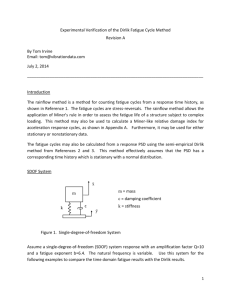
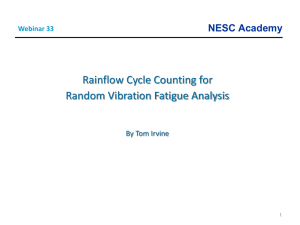
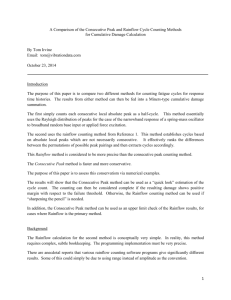
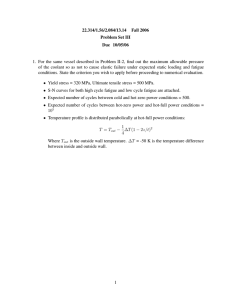
![Title: [Lifetime estimation of IGBT power modules] Semester: [10th](http://s2.studylib.net/store/data/018342815_1-99dcf921194845370bd26d8eeae88109-300x300.png)